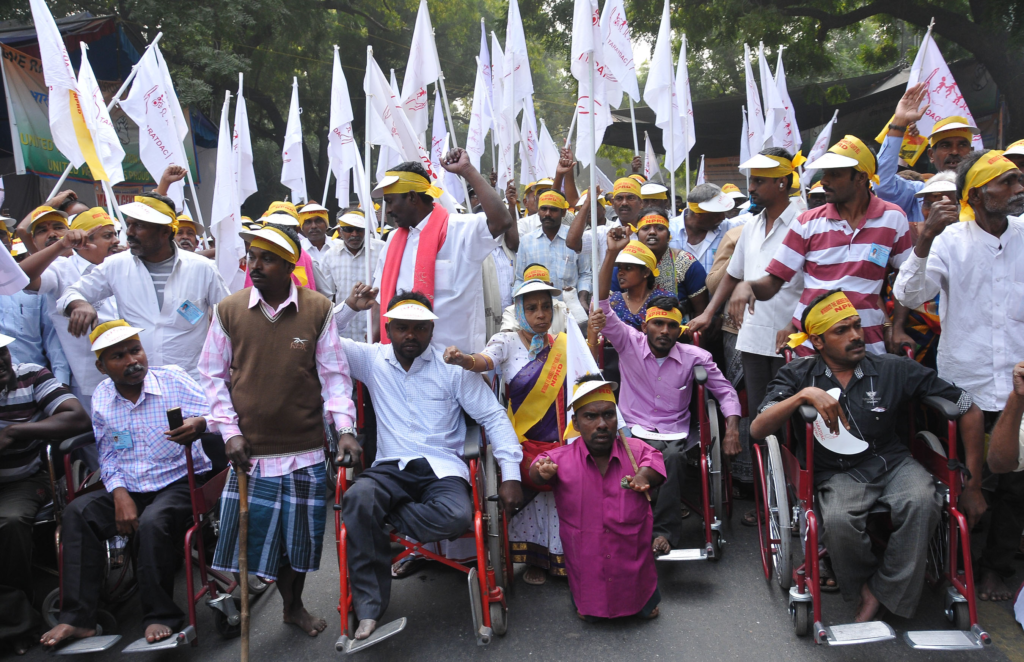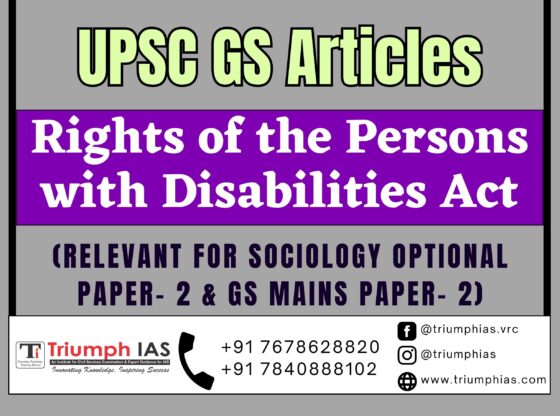Rights of the Persons with Disabilities Act
Relevant for sociology optional Paper- 2 & GS Mains Paper- 2

The Rights of Persons with Disabilities Act, also known as RPwD Act, was passed by the Indian Parliament in 2016. The Act replaced the Persons with Disabilities (Equal Opportunities, Protection of Rights and Full Participation) Act, 1995, which was considered outdated and inadequate in addressing the needs and rights of people with disabilities.
The RPwD Act is a comprehensive legislation that aims to ensure the full and equal participation of persons with disabilities in all aspects of life. It recognizes that people with disabilities face multiple forms of discrimination and marginalization and seeks to address these barriers through a rights-based approach. The Act covers a wide range of issues, including accessibility, education, employment, health, social security, and non-discrimination.
One of the key features of the RPwD Act is the expansion of the definition of disability. The Act recognizes 21 types of disabilities, including physical, sensory, intellectual, and mental disabilities. This wider definition ensures that people with different types of disabilities are included and their rights are protected.
The Act mandates the creation of a National and State-level Disability Rights Authority to promote and protect the rights of people with disabilities. The Authority is responsible for ensuring that all government and private sector services and facilities are accessible and barrier-free. It also has the power to investigate complaints of discrimination and take legal action against violators.
The RPwD Act mandates that all government buildings, public transport, and other public places are made accessible to people with disabilities. This includes the installation of ramps, accessible toilets, and other facilities. The Act also requires private sector entities, including businesses and educational institutions, to provide reasonable accommodation to persons with disabilities.
The Act recognizes the right to education of persons with disabilities and mandates that all schools and educational institutions provide inclusive education. It requires that reasonable accommodations are made to ensure that children with disabilities have access to the same quality of education as their non-disabled peers. The Act also mandates the creation of special schools and vocational training centers for children and adults with disabilities.
The RPwD Act recognizes the right to employment of persons with disabilities and mandates that all employers with 20 or more employees must reserve 4% of their vacancies for persons with disabilities. The Act prohibits discrimination in hiring, promotion, and other aspects of employment. It also requires that reasonable accommodations are made to ensure that persons with disabilities can perform their jobs effectively.
The Act recognizes the right to health of persons with disabilities and mandates that all healthcare facilities provide accessible and affordable healthcare services to persons with disabilities. It requires that healthcare professionals are trained to provide appropriate care to persons with disabilities and that medical equipment and facilities are made accessible.
The RPwD Act also recognizes the right to social security of persons with disabilities and mandates that all government schemes and programs are accessible to persons with disabilities. It requires that persons with disabilities are provided with financial assistance, pensions, and other benefits to ensure their well-being and social inclusion.
The Act prohibits discrimination against persons with disabilities in all aspects of life, including access to public spaces, employment, education, healthcare, and social security. It provides for legal remedies and penalties for violations of the Act. It also mandates the creation of special courts to handle cases related to violations of the rights of persons with disabilities.
In conclusion, the Rights of Persons with Disabilities Act is a landmark legislation that seeks to ensure the full and equal participation of persons with disabilities in all aspects of life. The Act recognizes the diverse needs and rights of people with disabilities and seeks to address the multiple forms of discrimination and marginalization they face. The Act mandates the creation of institutions and mechanisms to promote and protect the rights of persons with disabilities and provides for legal remedies and penalties for violations of their rights. The Act is a significant step towards creating a more inclusive and equitable society for all.
For more such free UPSC notes, Articles, News & Views Join our Telegram Channel. https://t.me/triumphias
Click the link below to see the details about the UPSC – Civils courses offered by Triumph IAS. https://triumphias.com/pages-all-courses.php


